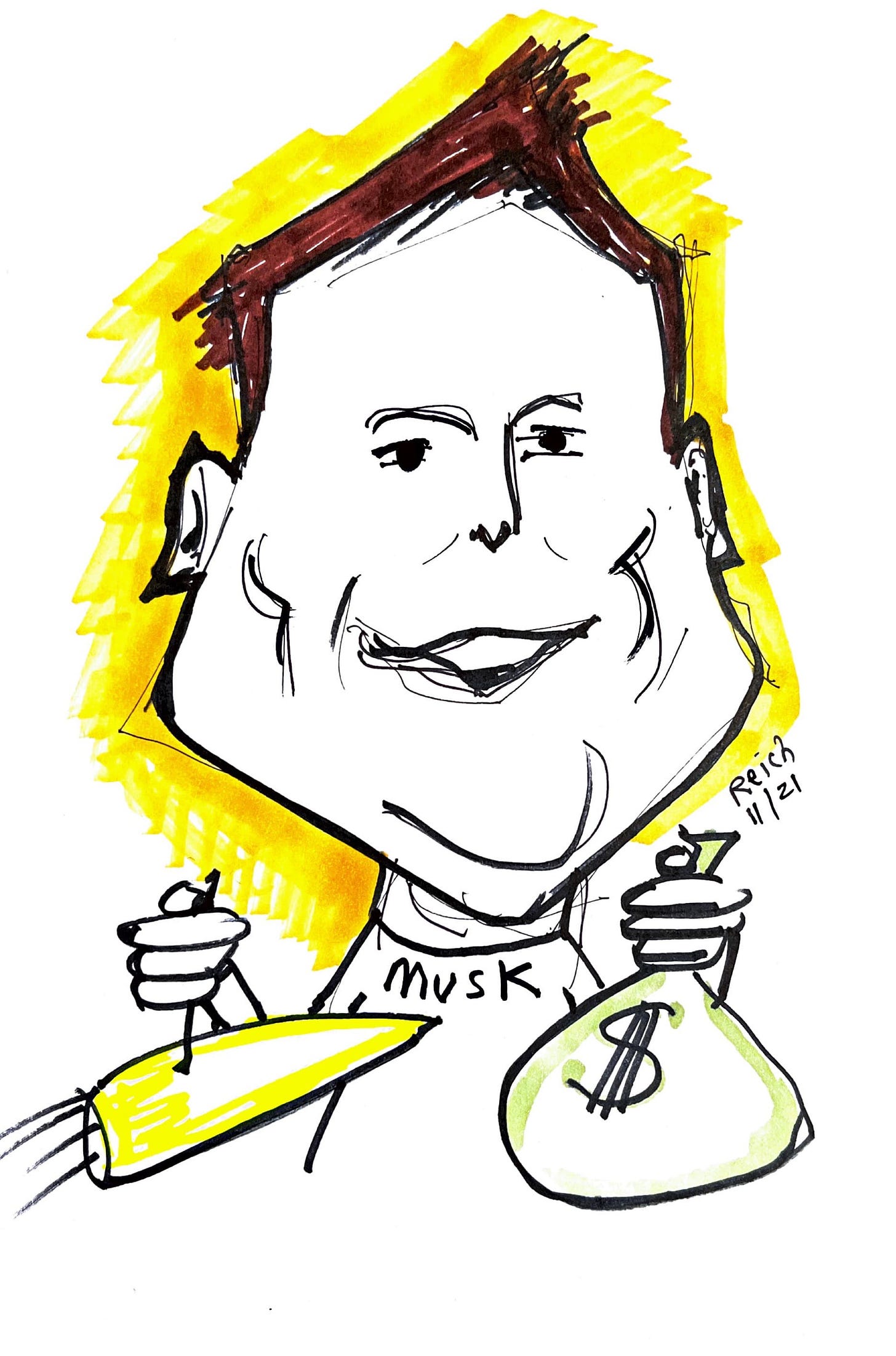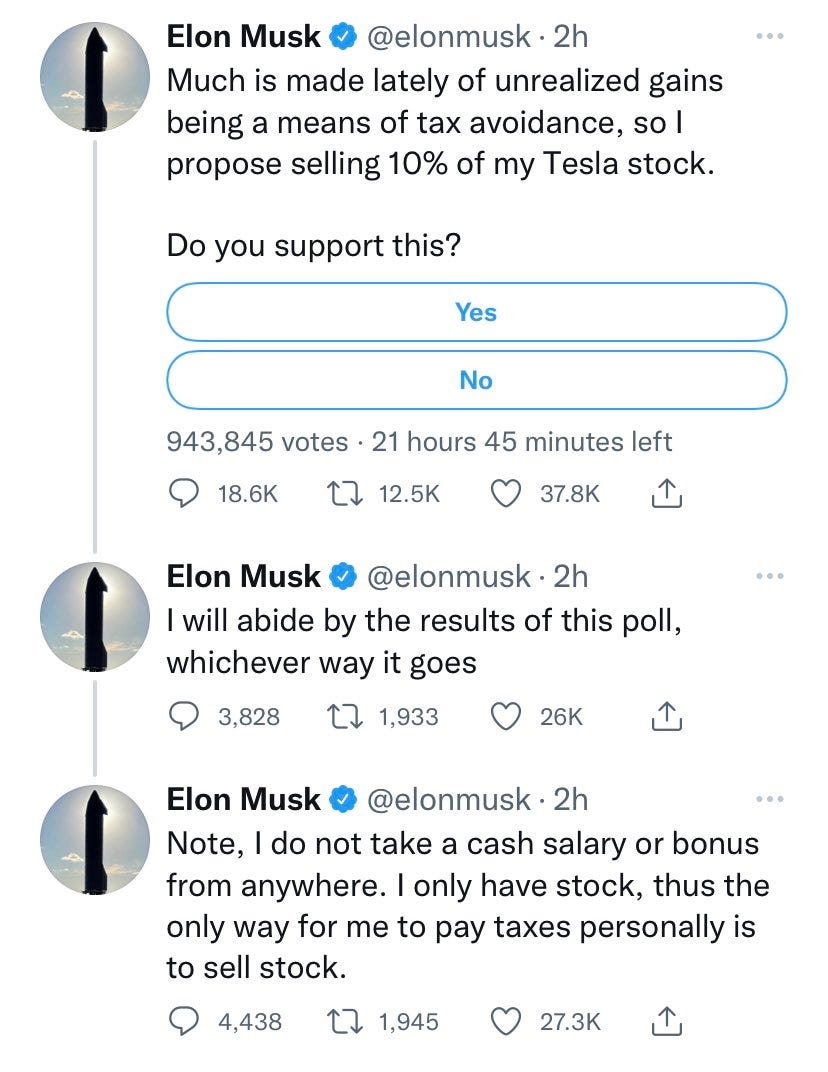Elon Musk's extraordinary twitter poll
And what it reveals about the absurdity of taxing income rather than wealth
Last weekend, Elon Musk used a twitter poll to make a political point, and it exploded in his and other Tesla investors’ faces.
Bear in mind that billionaires like him pay almost no income tax because they have almost no income. Their wealth is in shares of stock -- against which they borrow to finance their lavish lifestyles. (You and I can’t do this because no bank would lend us this much at an interest rate we could afford, but Musk and other billionaires live in a world unbounded by such constraints. Their wealth is so vast and they do so much banking business that any bank worth its salt is eager to lend them money at rock-bottom interest rates.)
Meanwhile, their “unrealized gains” — that is, the often eye-popping increases in their wealth driven by growing stock prices — avoid taxation. Presumably they could continue to borrow against their wealth forever — only paying out interest on that debt, and almost no income taxes — and then pass their fortunes on to their heirs tax free. In point of fact, that’s what’s happening all over billionaire America. It’s called dynastic wealth.
I don't know a better argument for why we need a wealth tax.
But Musk -- now the richest person in the world, with assets totaling some $318 billion, mostly in Tesla stock -- thinks a wealth tax would be "unfair" because it would force him to sell shares of stock when he had to pay any significant taxes. “I do not take a cash salary or bonus from anywhere. I only have stock, thus the only way for me to pay taxes personally is to sell stock,” he tweeted.
Poor baby.
So last weekend, seeking to call a symbolic bluff on advocates of taxing wealth, he asked his millions of Twitter followers whether he should sell 10 percent of his Tesla stock. He committed to abide by the results of the poll. (He faces a contractual deadline for selling a load of stock options anyway.) By the time he closed the poll Sunday, nearly 3.5 million votes had been cast. 58 percent were in favor of him selling.
We don’t know yet exactly how much more taxes Musk will have to pay for 2021 than he paid for 2020, as a result of the sale. But it’s almost certain to be way more. Which raises the question whether taxing billionaires according to the results of twitter polls they create is really the best way to go about it.
We also know this escapade caused Tesla shares to tumble 4.8 percent Monday, at a time when many analysts believe the firm is already overvalued.
This may have created another legal headache for Musk. He and Tesla previously settled a lawsuit by the S.E.C. over one of his tweets saying he had secured money to take the company private. Part of that agreement included having Tesla-related tweets vetted by company lawyers. I very much doubt his last weekend tweet poll was vetted (what sane lawyer would approve such a thing?) even though the poll and its outcome have had a material effect on the price of Tesla shares of stock. Next move is up to the S.E.C. and lawyers representing shareholders who lost boatloads of money yesterday.
(Oh, and the S.E.C. might also want to take a look at another curious Musk tweet initiative over the weekend. On Sunday he switched the name on his Twitter account to "Lorde Edge.” On Monday, a so-called “Lorde Edge” bitcoin began trading — surging 825 percent from its opening price and pulling in nearly $27 million, according to data from CoinMarketCap.)
Poor Elon.






IRS: Hi, Elon, it's tax time. You don't take a salary, so we don't tax that. Your stock, well, we don't tax that either. But how much did you borrow to "live" for the year? We'll be taxing that at a reduced amount (not 100% reduction) to include the interest you pay. We have decided that what you borrow in this special way - a way not open to the rest of us - will count as income because you use it same as everyone else uses their income, namely, to live. Fair enough?
ELON: But but but
Promising to sell $30 billion of stock based on a twitter poll is like saying "I have such a ridiculously huge amount of money I don't know what to do with it." Why doesn't he commit to doing something useful with his money?
Would it not be possible to change the tax rules to count borrowings against stock as taxable realized gains?